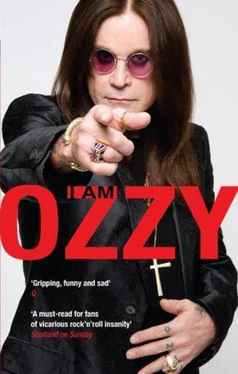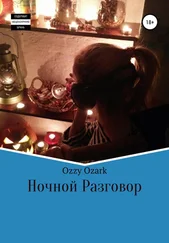But let me tell you something: it’s not fucking easy, catching a chicken, especially when it’s getting dark and you haven’t slept for twenty-four hours and you’re fucked up on a shitload of booze and coke and you’re wearing a dressing-gown and welly-boots.
So I clomped back over to the shed, found a sword, and came out with it raised above my head, Samurai-style. ‘Die, you chicken bastard, die!’ I shouted, as the chicken made a last-ditch run for the fence at the end of the garden, its little beak nodding so fast it looked like its head could fly off at any second. I’d almost caught up with it when the front door of my neighbour’s house burst open. Then this little old lady—Mrs Armstrong, I think her name was—came running out with a garden hoe in her hands. She was used to all kinds of crazy shit going on at Bulrush Cottage, but this time, I don’t even think she could believe it. With the coop burning and the rounds from my gun exploding every few minutes, it was like a scene from an old World War Two movie.
Bang!
Bang!
Bang-bang-bang!
At first I didn’t even notice her. I was too busy chasing the chicken, which ended up bolting under the fence and legging it up Mrs Armstrong’s driveway, out of her gate, and down Butt Lane in the direction of the pub. Then I looked up and our eyes met. I must have been quite a sight, standing there in my dressing gown with a crazed look on my face, splattered with blood, and holding up a sword, my garden on fire behind me.
‘Ah, good evening, Mr Osbourne,’ she said. ‘I see you’re back from America.’
There was a long silence. More cartridges exploded behind me. I didn’t know what to say, so I just nodded.
‘Unwinding, are we?’ she asked.
I wasn’t the only one going out of my mind with the stress of the band imploding.
I remember one time, Geezer phoned me up and said, ‘Look, Ozzy, I’m sick of touring just to pay the lawyers. Before we go on the road again, I wanna know what we’re gonna get.’
And I said to him, ‘Y’know what, Geezer, you’re right. Let’s call a meeting.’
So we had a meeting, and I was the first one to speak up.
‘Look, lads,’ I said, ‘I think it’s crazy that we’re doing gigs to pay the lawyers. What d’you think, Geezer?’
Geezer just shrugged and said, ‘Dunno.’
That was it.
I’d had enough. There didn’t seem to be any point any more. None of us was getting on.
We were spending more time in meetings with lawyers than we were writing songs; we were all exhausted from touring the world pretty much non-stop for six years; and we were out of our minds on booze and drugs. The final straw was a meeting with Colin Newman, our accountant, where he told us that if we didn’t settle our tax bills soon, we’d be going to prison. In those days, the tax rate for people like us was something like 80 per cent in the UK and 70
per cent in America, so you can imagine the amount of dough we owed. And after the taxes, we still had our expenses to pay. We were broke, basically. Wiped out. Geezer might not have had the bollocks to say anything in front of the others, but he was right: there was no point in being in a rock ’n’ roll band just to worry about money and writs all the time.
So one day I just walked out of a rehearsal and didn’t come back.
Then I got a call from Norman, my sister Jean’s husband.
Now, he’s a lovely guy, Norman—in many ways the older brother I never had. But whenever he called, it usually meant something heavy was going down with the family.
This time was no different.
‘It’s your dad,’ said Norman. ‘You should go and see him.’
‘What d’you mean?’
‘He’s not well, John. He might not make it through the night.’
I immediately felt sick and numb. Losing a parent had always been my worst fear, ever since I was a little kid, when I would go up to my dad’s bed and shake him awake because I thought he wasn’t breathing. Now the fear was coming true. I knew my dad had been ill, but I hadn’t thought he was at death’s door.
When I pulled myself together, I got in the car and went to see him.
My whole family was already there by his bedside, including my mum, who was just absolutely devastated.
Dad was riddled with cancer, it turned out. It was out of control, because he’d refused to go and see a doctor until they had to carry him away in an ambulance. He’d stopped working only a few months before. He was sixty-four, and they’d offered him an early retirement deal.
‘I’m gonna have some time to do the garden now,’ he’d told me. So he did the garden. But as soon as he’d done the garden, that was it. Game over.
I was terrified of seeing him, to be honest with you, because I knew what to expect. My dad’s younger brother had died the year before from liver cancer. I’d visited him on the ward and it had shocked the crap out of me, so much so that I’d burst into tears. He bore no resemblance to the guy I’d known. He didn’t even look human.
When I got to the hospital this time, my dad had just come out of surgery, and he was up and running. He looked all right, and he managed a smile. They had him on the happy juice, I imagine. Although, as one of my aunties used to say, ‘God always gives you one good day before you die.’ We talked a little, but not much. The funny thing is, when I was growing up, my dad never used to say anything like, ‘You wanna watch those cigarettes,’ or, ‘Stop going to the pub all the time,’ but that day he told me, ‘Do something about your drinking, John. It’s too bloody much. And stop taking sleeping pills.’
‘I’ve left Black Sabbath,’ I told him.
‘They’re finished then,’ he said. Then he fell asleep.
The next day, he took a dive. One of the worst things about it was seeing my mum so distraught. In hospitals back then, the sicker you got, the further they moved you from the other patients. By the end of the day, my dad had been shoved into this broom cupboard in the corner, with mops and buckets and tubs of bleach all over the place. They’d put bandages around his hands like he was a boxer, and they’d tied him to the bars of this giant cot, because he’d kept pulling out his IV tube. It really fucked me up, seeing him like that, the man I adored, the man who’d taught me that even if you don’t have a good education, you can still have good manners. At least he was loaded on all kinds of drugs, so he wasn’t in too much pain. When he saw me, he smiled, stuck his thumbs up through his bandages and went,
‘Speeeeed!’—it was the only drug he knew the name of. Mind you, then he said, ‘Take these fucking pipes out of me, John, they hurt.’
He died at 11.20 p.m. on January 20, 1978: in the same hospital, on the same date, at the same time as Jess had been born six years earlier. That coincidence still floors me to this day. The cause of death was given as ‘carcinoma of the oesophagus’, although he also had cancer of the intestines and cancer of the bowel. He hadn’t eaten or gone to the bog by himself for thirteen weeks. Jean was with him when he passed away. The doctors told her they wanted to find out why their Frankenstein experiment on him the previous day in surgery hadn’t worked, but she wouldn’t let them do an autopsy.
I was in the car, on my way to Bill’s house, listening to ‘Baker Street’ by Gerry Rafferty, at the moment he passed away. As soon I pulled up in Bill’s driveway, he was standing there, with a grim look on his face. ‘Someone’s on the phone for you, Ozzy,’ he said.
It was Norman, giving me the news. To this day, whenever ‘Baker Street’ comes on the radio, I hear Norman’s voice and feel that intense sadness.
His funeral was a week later, and he was cremated. I really hate the way traditional English funerals are organised: you’re just starting to get over the shock of the death, then you have to go through it all over again. The Jews have a far better idea: when someone dies, you bury them as soon as possible. At least that way you get it all out of your system quickly.
Читать дальше


